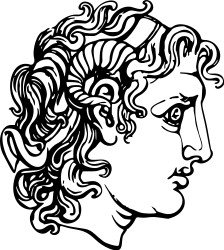Owing to its rich, turbulent, and world-influencing history, Greece and its people remain the subject of many discussions, debates, and analyses, particularly within learned circles. Academic texts throughout the world typically dedicate entire chapters on some expression of the human mind that flourished in Ancient Greece: linguistics, logic, politics, military tactics, philosophy, mathematics, literature, art; you name it. Most of these rather remarkable accomplishments happened more than 2 millennia ago; that’s hardly recent history, and yet its legacy remains relevant to this day.

The Venus de Milo: A famous Ancient Greek sculpture
Growing up in Greece, I vividly remember how, as kids, we were constantly showered—mostly by teachers and politicians—with tales of our “glorious forefathers,” whose idealized life accounts were used as fuel for inspiring us to “achieve greatness”: Homer the Epic Poet, Socrates the Philosopher, Pericles the Statesman, Leonidas the Warrior King, Archimedes the Inventor, Alexander the World Conqueror, Cleopatra the Last Greek Pharaoh, Kolokotronis the Freedom Warrior, Venizelos the Ethnarch, Papanicolaou the Doctor (of Pap test/smear fame). The list just goes on and on, with a wide selection of figures that lived from millennia to just a few years ago.

One of the most famous Greeks in history: Alexander the Great
No wonder a considerable fraction of modern Greeks choose to believe that, when the Parthenon was being built, “barbarians”—a term originally used to broadly refer to all non-Greeks—were, at best, just discovering fire or the wheel. I prefer to think of loaded historical legacies as a heavy burden that comes with a price: You need to live up to it through deeds of your own. In my experience, most Greeks find this a rather expensive price to pay, so they opt for using their legacy as a justification for a grandiose sense of entitlement.

What Greeks think non-Greeks looked like 2.5 millennia ago
Greece’s more recent—yet still rather ancient—history is marked by less academic achievements, but still lots of turmoil. Since the fall of the Eastern Roman Empire (roughly half a millennium ago) by the Ottomans, practically all of modern Greece fell under Turkish rule. This lasted for approximately 400 years and ended about 200 years ago, when the Greeks successfully united and revolted against their Turkish overlords, eventually declaring independence and forming their own state.

The national flag of the modern nation-state of Greece
In a sense, Greek emancipation from Ottoman rule marks the beginning of a new chapter in Greek history: It signifies the formation of Greece as a modern nation-state, united under common laws and held together by common national and religious symbols and rituals. Even so, 400 years of Turkish rule have undoubtedly left a strong mark on modern Greece; I’m confident enough to claim that our cultures are so strongly intertwined, that they’re almost symbiotic in nature. And yet, there’s still mindless enmity between us. Oh well.

A pita gyros looks a lot like a döner kebab, doesn’t it?
Since I was a kid, I realized that most of my fellow Greeks have a strong distrust of their own elected government, which they frequently refer to as corrupt, oppressive, and power-hungry. Kind of like a big, bullish overlord you have to serve, but rather wouldn’t. This attitude might’ve made sense 400 years ago when Greeks were under Turkish rule, but is apparently still deeply rooted into the culture. Furthermore, since widespread memes of this kind tend to become self-fulfilling prophecies, it’s unsurprising that Greek tax officials seem to act as if everyone’s in principle guilty of tax evasion, unless proven otherwise. Or unless you know the right people.

How the average Greek views his own government
But enough of old history that’s not directly relevant to modern affairs. A more recent overview of Greek history—post-WWII developments in particular—is required for a better approximation of what modern Greece and its people are all about. In our days, the “Cradle of Western Civilization” seems to receive an increasing volume of negative, yet highly polarizing media coverage: From bankrupt hedonists wasting other people’s money to unfortunate souls exploited by a powerful global elite, there’s doesn’t seem to be much room in the middle for describing Greeks. Is it even worth averaging through that much noise to search for a kernel of truth?
Continued in Part II...
Πολύ καλό άρθρο!!!
Downvoting a post can decrease pending rewards and make it less visible. Common reasons:
Submit
Ευχαριστώ αδερφέ! Έχω πολλά μαζεμένα απ' την μητέρα πατρίδα, καιρός να τα βάλω σε μια σειρά...
Downvoting a post can decrease pending rewards and make it less visible. Common reasons:
Submit
Προσπάθησε να ανεβάζεις καθημερινά και είμαι σίγουρος ότι θα τα πάς καλά!
Downvoting a post can decrease pending rewards and make it less visible. Common reasons:
Submit